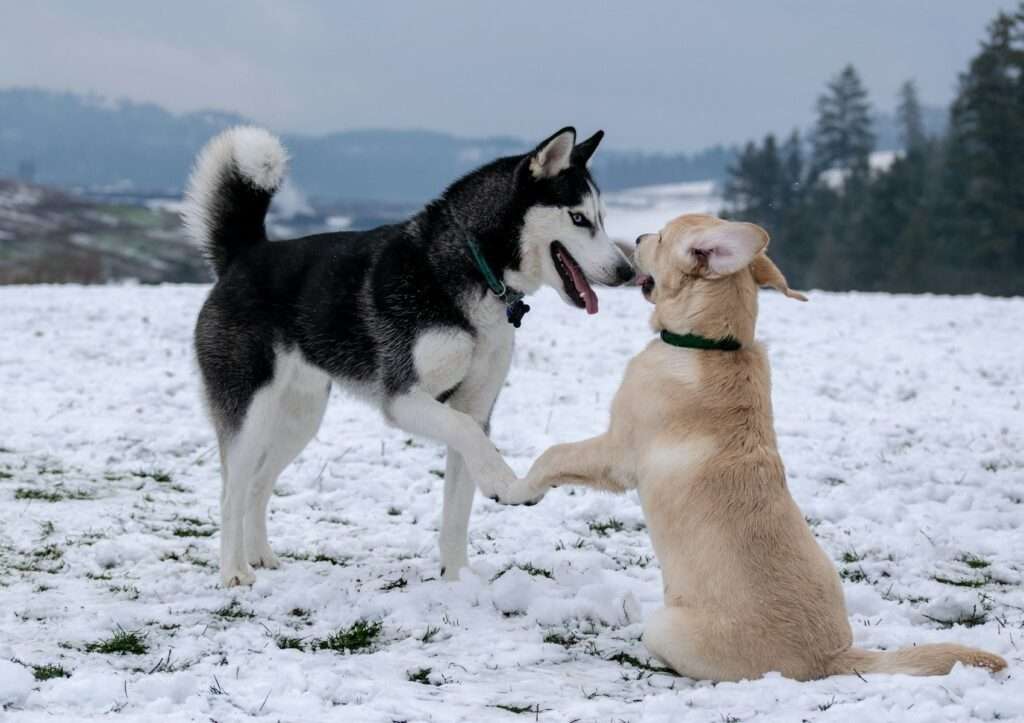Why Do Male Dogs Kill Puppies? 6 Shocking Reasons Exposed!
When it comes to the world of dogs, our furry companions often exhibit behavior that is both fascinating and sometimes puzzling. One such enigma we’ll explore is ‘why do male dogs kill puppies.’ At BarkLikeMeow, we’re dedicated to unraveling the mysteries of canine behavior and helping pet parents better understand their four-legged friends.
In this comprehensive guide, we’ll delve into the complex world of male dogs and their interactions with puppies. We’ll explore the biological and evolutionary factors that influence their actions and the various reasons behind their sometimes perplexing behavior. By the end of this article, you’ll have a clearer understanding of this unique canine behavior and how to ensure the safety and happiness of your entire canine family.
The Natural Instincts of Male Dogs

Dogs, as we know them today, are the result of thousands of years of domestication, yet they still carry the traces of their wild ancestors. In the canine world, male dogs play a unique role, influenced by their natural instincts and historical functions.
In the wild, male dogs, like their ancestors, had responsibilities that revolved around protecting the pack and ensuring its survival. They were the guardians of territory and often engaged in territorial disputes with other canine groups. This territoriality is a key element in understanding their behavior towards puppies, as they view the pack’s safety as their utmost priority.
Territoriality aside, male dogs, even within a domestic setting, still carry elements of their ancestors’ protective instincts. While domestic dogs don’t have the same threats as their wild counterparts, this protective nature can sometimes manifest in unexpected ways, such as aggression towards puppies.
Join us on this journey as we explore the intricate world of male dogs and their interactions with puppies. Together, we’ll uncover the underlying factors and nuances that shape their behavior, and learn how to ensure a harmonious coexistence between our beloved pets.
Possible Reasons Behind Why Do Male Dogs Kill Puppies
Now that we’ve touched upon the natural instincts that male dogs carry from their ancestors, let’s delve into the intricate reasons why some male dogs may exhibit aggression towards puppies. It’s important to remember that these behaviors are not a reflection of their ‘bad’ nature, but rather a result of various underlying factors.
- Lack of Paternal Instincts: In the dog world, the maternal and paternal instincts differ significantly. While female dogs typically have strong maternal instincts, male dogs don’t always exhibit the same nurturing behaviors. Some male dogs may lack the inherent desire to protect or care for puppies, leading to situations where they display aggression.
- Competition for Resources: Competition for resources, such as food, attention, and territory, can ignite aggression in male dogs. In a household with puppies, males might perceive these young ones as competitors for limited resources. This competition-driven aggression can manifest in various ways.
- Health Issues and Pain: Dogs, like humans, can experience health issues and pain, which can dramatically affect their behavior. A male dog in pain may become irritable and intolerant, which could lead to aggression towards puppies, especially if they inadvertently cause discomfort.
- Social Stress and Hierarchy: Within a pack, whether it’s a domestic setting or a wild one, a social hierarchy plays a pivotal role. Disruptions or conflicts within this hierarchy can induce stress, making some male dogs resort to aggression, even towards puppies, to maintain their perceived status.
- Fear and Anxiety: Fear and anxiety are powerful motivators for any being, including dogs. In some cases, a male dog may become fearful or anxious about the presence of puppies, triggering defensive or aggressive responses.
- Genetic Factors: Genetics also play a role in shaping a dog’s temperament. Some dogs may inherit certain predispositions that make them more likely to display aggressive behaviors, especially towards puppies.
Signs of Aggression in Male Dogs
Recognizing the signs of aggression in male dogs is crucial for preventing conflicts and ensuring the safety of all your furry family members. These signs may include:
- Growling and snarling
- Bared teeth
- Stiff body language
- Raised fur on the back (hackles)
- Lunging or snapping
By understanding these cues and acting promptly, you can manage situations to prevent harm and foster a harmonious environment for your dogs. Stay with us as we continue our exploration into preventing and addressing aggression in male dogs towards puppies, ensuring a loving and safe atmosphere for your four-legged companions.
Preventing Aggression in Male Dogs Towards Puppies

At BarkLikeMeow, we’re all about creating a safe and loving environment for your furry family members. If you’re concerned about aggression in your male dog towards puppies, rest assured there are steps you can take to prevent conflicts and foster a harmonious pack dynamic.
- Early Socialization: Early socialization is key to ensuring that your male dog develops positive relationships with puppies. It’s crucial to expose your dog to puppies from a young age, allowing them to learn and adapt to different social situations. Encourage supervised interactions in a controlled environment, promoting positive associations between your male dog and puppies.
- Training and Obedience: Training and obedience go a long way in curbing aggression in male dogs. Positive reinforcement techniques can help you manage their behavior and create a structured and disciplined household. Consistency and patience are paramount when implementing these methods.
- Medical Evaluation: A male dog exhibiting aggression may have underlying health issues that need addressing. Regular veterinary check-ups can help identify and treat any discomfort, pain, or medical conditions that may be contributing to the aggressive behavior. A healthy dog is a happier dog.
- Behavioral Modification: In some cases, you may need to consider behavioral modification techniques. Working with a professional dog trainer or behaviorist can provide tailored solutions to address specific aggression issues. These experts can help you implement strategies that promote peaceful coexistence within your canine family.
Case Studies and Success Stories
Let’s take a moment to find inspiration in real-life stories of male dogs who overcame aggression towards puppies. These heartwarming tales prove that with the right approach and dedication, positive change is possible.
Case Study 1: Max’s Transformation
Max, a male Labrador Retriever, had a history of displaying aggression towards puppies in his household. His pet parents decided to consult a dog behaviorist, who implemented a training and socialization program. Over time, Max learned to coexist peacefully with the new puppy in the family, showcasing the incredible potential for change through the right guidance.
Case Study 2: Benny’s Journey to Harmony
Benny, an Australian Shepherd, exhibited territorial aggression towards puppies entering his home. With consistent training, behavioral modification, and plenty of positive reinforcement, Benny’s behavior transformed. He became a loving and protective older brother to the new puppy, demonstrating that even strong-willed dogs can learn to embrace newcomers.
These success stories underscore the importance of patience, dedication, and professional guidance in addressing aggression in male dogs towards puppies. Your canine family members have the capacity to change and thrive in a peaceful and loving environment.
When to Seek Professional Help
Guidance and resources are available to help ensure a happy and harmonious environment for your canine family. While many cases of aggression in male dogs towards puppies can be managed with the right knowledge and techniques, there are instances where professional help is essential.
You should consider seeking professional assistance when:
- Aggressive behavior persists or escalates, despite your efforts to address it.
- Your male dog’s aggression poses a significant risk to the safety of other animals or family members.
- You’re unsure about the underlying causes of the aggression.
- You’re facing a complex or challenging situation that requires expert guidance.
Professional dog trainers and behaviorists have the experience and expertise to assess the unique dynamics of your household and offer tailored solutions to address aggression. Don’t hesitate to reach out to these professionals when needed, as their intervention can make a profound difference in your canine family’s life.
Conclusion
In the world of dogs, understanding their behaviors and interactions is an ongoing journey. Aggression in male dogs towards puppies may seem puzzling, but with knowledge, patience, and the right approach, it can be managed effectively.
We’ve explored the natural instincts of male dogs, the reasons behind their aggression towards puppies, and provided valuable insights into recognizing signs of aggression. We’ve also delved into preventive measures, including early socialization, training, and addressing medical concerns.
Real-life success stories prove that positive change is achievable with dedication and the right guidance. Remember, professional help is always available when needed.
In conclusion, aggression in male dogs towards puppies is a complex issue, but it can be addressed with love, patience, and expert support. By following the advice and strategies provided in this comprehensive guide, you’re well on your way to creating a peaceful and loving environment for all your furry family members. Together, we can ensure that your canine companions lead happy and harmonious lives.
Frequently Asked Questions
Why do male dogs sometimes exhibit aggression towards puppies?
Aggression in male dogs towards puppies can be attributed to a range of factors, including territorial instincts, competition for resources, and a lack of paternal instincts. Understanding these root causes is essential in addressing this behavior.
Can this aggression ever be completely eliminated?
While complete elimination of aggression may not always be possible, it can often be managed or reduced with the right training and behavior modification strategies. The goal is to ensure the safety and well-being of all dogs in the household.
Are certain breeds more prone to aggression towards puppies?
The tendency for male dogs to exhibit aggression towards puppies is not necessarily breed-specific. It primarily depends on the individual dog’s temperament and their socialization experiences.
How long does it take to see improvement in a male dog’s behavior towards puppies?
The timeline for improvement varies from dog to dog. It may take weeks to months of consistent training and behavior modification to see noticeable progress. Patience and dedication are crucial.
Can neutering or spaying my male dog help reduce aggression towards puppies?
Neutering or spaying can influence a dog’s behavior, but its impact on aggression towards puppies varies. Consulting with a veterinarian is recommended to discuss the potential benefits of these procedures.
Is aggression towards puppies an indication of a ‘bad’ dog?
No, aggression towards puppies doesn’t make a dog ‘bad.’ It’s often a response to specific triggers or circumstances. By understanding the underlying causes and addressing them, you can help your dog live a happy, fulfilling life alongside puppies.
What are the common signs of aggression in male dogs towards puppies?
Signs of aggression may include growling, bared teeth, stiff body language, raised fur (hackles), and lunging. Recognizing these cues is important for safety.
Can socialization and training help male dogs become more tolerant of puppies?
Yes, with proper socialization and training, male dogs can become more tolerant and even affectionate towards puppies. Many success stories illustrate this positive transformation.
When should I consider professional help for aggression issues in male dogs towards puppies?
Professional help should be sought when aggression persists or escalates, poses a safety risk, or when you’re unsure about the underlying causes. Experienced dog trainers and behaviorists can provide tailored solutions.
How can I ensure the safety and happiness of both my male dog and puppies in the household?
Ensuring safety and happiness involves early socialization, training, addressing health concerns, and, when necessary, consulting with professionals. Every dog is unique, and a tailored approach is key to a harmonious canine family.




